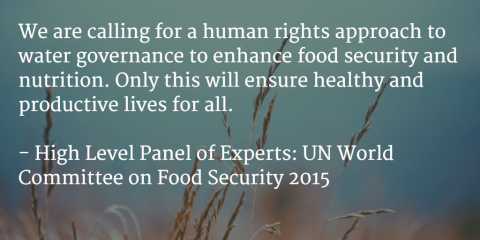The real work begins now. It’s time to act!
Blog written by Nathalie Seguin of Freshwater Action Network- Mexico (FAN-Mex) following the Sustainable Development Summit in New York, September 2015.
The new Global Goals have been formally adopted, setting the planet’s agenda for development for the 15 years. This is a truly momentous occasion; for our future development, and for ending poverty in our generation. Ban Ki-Moon, the Secretary General of the United Nations stated that this new development framework is a universal and transformative agenda. He emphasized that taking bold and transformative steps are urgently needed to shift the world onto a sustainable and resilient path. He compelled us to see and act both within, and outside of, our own borders.
There was much enthusiasm and congratulations in the General Assembly, but Salil Shetty, Secretary General of Amnesty International, brought some harsh reality to the room when he recalled that too many people are suffering multiple human rights violations and that this needed to change. He made a call to all Member States to implement four key tests to ensure the success of the Global Goals and to truly put an end to human rights abuses:
1 – Ownership test: to ensure that the Goals are resourced, implemented and aligned with existing human rights;
2 – Accountability test: that people must hold their governments accountable to realising these goals;
3 – Non-discriminatory test: inequality is the failure to protect the rights of the most marginalised;
and 4 – Coherence test: you cannot claim to end inequalities, when you are protecting those who have the most. You cannot claim peace, when you are investing in arms businesses.
These fundamental points of inclusion, accountability and ownership were echoed in the opening speech issued by Pope Francis. He stated that “economic and social exclusion is a complete denial of human fraternity and a grave offense against human rights and the environment. The poorest are those who suffer most from such offenses, for three serious reasons: they are cast off by society, forced to live off what is discarded and suffer unjustly from the abuse of the environment. … For all this, the simplest and best measure and indicator of the implementation of the new agenda for development will be effective, practical and immediate access, on the part of all, to essential material and spiritual goods: housing, dignified and properly remunerated employment, adequate food and drinking water; religious freedom and, more generally, spiritual freedom and education. These pillars of integral human development have a common foundation, which is the right to life and, more generally, what we could call the right to existence of human nature itself.” (For the full text of Pope Francis’s speech, visit online)
During the following three days of plenary sessions, Member States reaffirmed their commitment to implementing Agenda 2030. There was repeated reference that COP 21, the next important global meeting taking place in early December this year, could transform this agenda to be truly transformational or not. Negotiations on climate change haven’t yet shown positive agreements, and a real fracture exists between the global South and North. This was mentioned by many leaders from the global South, but it was the president of Honduras who summed it up best, stating “when it comes to climate change, we are not the same. Countries that haven’t contributed to the actual level of greenhouse gas emission are suffering and will suffer the highest impact that global warming is causing. I call upon all nations, especially the developed countries, to tackle the SDGs and to deal with the challenges and effects on climate change within the framework of co-responsibility that all, without exception and starting today, should recognize as a principle–guide of the actions of the international community. The hour has arrived to assume co-responsibility as a moral and political imperative”
We have to end inequalities. The unfinished business of this agenda will be to ensure future accountability as a critical action. The process of developing the global goals has been lauded as incredibly inclusive and participatory. The UN Non-Governmental Liaison Service (UN-NGLS) who worked tirelessly to ensure open, transparent, and participatory processes for civil society engagement in the formulation of the post-2015 development agenda received a very emotive standing ovation from the audience of 570 participants. This will hopefully translate into action whereby governments and civil society shall fully collaborate to implement Agenda 2030.
Inclusion and accountability are at the heart of Agenda 2030. Alicia Bárcena, Executive Secretary of the Economic Commission for Latin America and the Caribbean (ECLAC) echoed Beyond 2015 (a global civil society campaign) and their call for countries to act and to include civil society to ensure the successful delivery of the Global Goals. She added that it is also time for countries to prove and move!
It is time for all countries to enable civil society to play its critical and fundamental role to succeed, but do not forget that financing this civil society participation and capacity building for this task cannot be minimised or postponed. End Water Poverty, along with other civil society organisations, echoes the Pope in his call that now is the time for action. “We cannot permit ourselves to postpone “certain agendas” for the future. The future demands of us critical and global decisions in the face of worldwide conflicts which increase the number of the excluded and those in need.”
